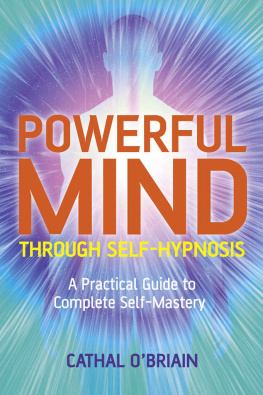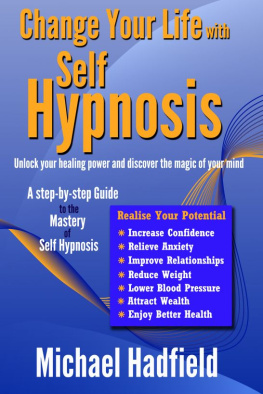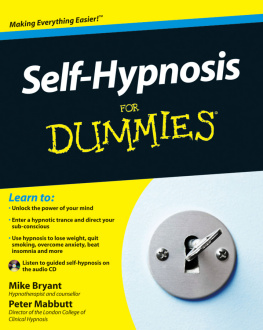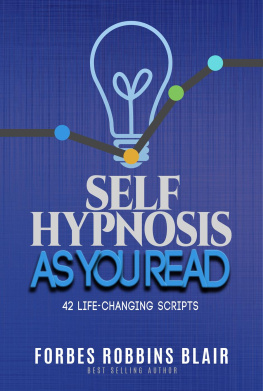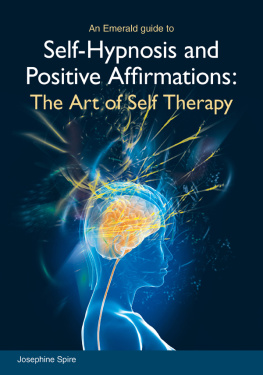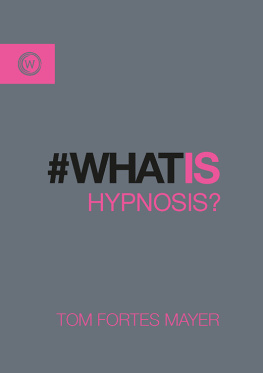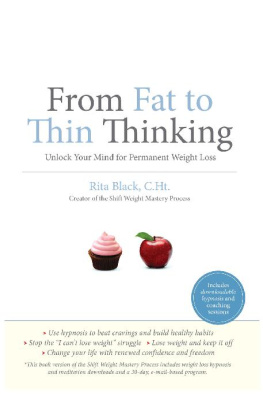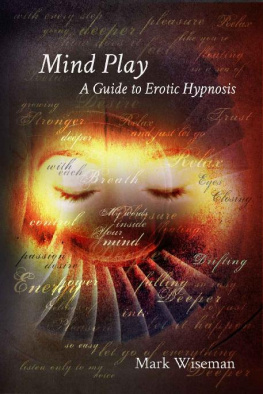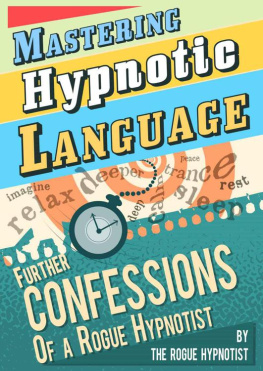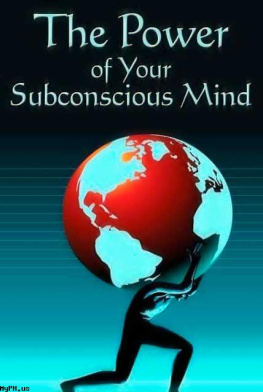Powerful
Mind Through
Self-Hypnosis
A Practical Guide to
Complete Self-Mastery
First published by O-Books, 2010
O Books is an imprint of John Hunt Publishing Ltd., The Bothy, Deershot Lodge, Park Lane, Ropley,
Hants, SO24 0BE, UK
www.o-books.com
Distribution in:
UK and Europe
Orca Book Services Ltd
Home trade orders
Tel: 01235 465521 Fax: 01235 465555
Export orders
Tel: 01235 465516 or 01235 465517
Fax: 01235 465555
USA and Canada
NBN
Tel: 1 800 462 6420 Fax: 1 800 338 4550
Australia and New Zealand
Brumby Books
Tel: 61 3 9761 5535 Fax: 61 3 9761 7095
Far East (offices in Singapore, Thailand,
Hong Kong, Taiwan)
Pansing Distribution Pte Ltd
Tel: 65 6319 9939 Fax: 65 6462 5761
South Africa
Stephan Phillips (pty) Ltd
Email:
Tel: 27 21 4489839 Telefax: 27 21 4479879
Text copyright Cathal OBriain 2010
ISBN: 978 1 84694 298 3
Design: Stuart Davies
All rights reserved. Except for brief quotations in critical articles or reviews, no part of this book may be reproduced in any manner without prior written permission from the publishers.
The rights of Cathal OBriain as author have been asserted in accordance with the Copyright, Designs and Patents Act 1988.
A CIP catalogue record for this book is available from the British Library.
Printed in the UK by CPI Antony Rowe Printed in the USA by Offset Paperback Mfrs, Inc
We operate a distinctive and ethical publishing philosophy in all areas of its business, from its global network of authors to production and worldwide distribution.
Powerful
Mind Through
Self-Hypnosis
A Practical Guide to
Complete Self-Mastery
Cathal OBriain

Winchester, UK
Washington, USA
Dedication
This book is dedicated to Jeff Gill. It was only when you were gone, I
realized I had a best friend.
The real you is emerging. The happy one. The peaceful one. The
powerful one. A kindred spirit who is forever the learner, the observer.
Neven shaken by fear, empowered by truth.
About the Author
Cathal OBriain is a native of Dublin, Ireland and currently resides at his home and practice in County Kildare. He is a certified hypnotherapist, psychotherapist, and hypno-analyst. Cathal is also a member in good standing with the Institute of Clinical Hypnotherapy and Psychotherapy (IRL). His main areas of interest are hypnotherapy, psychoanalysis, mythology, and religion. In his capacity as Public Relations Officer and Speaker for the ICHP (named above), he frequently gives lectures in SelfHypnosis and Analytical Psychotherapy at Marino College, Dublin. He also writes for their quarterly journal, The Hypno Analyst.
On completing second level education, Cathal began studying at Milltown Institute of Theology and Philosophy, where he hoped to get a taste of religious life. Taking classes in philosophy, and cognitive psychology, he savored his time there, but felt his Christian vocation lay elsewhere. Encouraged by a need to understand more about thinking, he then turned his attention to the study of hypnotherapy, art, and psychoanalysis. Cathal paid his way through college by working part time with physically challenged adults in the Richmond Cheshire Homes, Monkstown, Dublin. Much of his research there was centered on the effectiveness of self-hypnosis in easing muscular tension. Many of the young adults he worked with, some crippled with cerebral palsy and multiple sclerosis, found Cathals hypnotic methods effective in relieving pain, and aiding sequential movement. Recalling his stay at the home, Cathal stressed that,
In order for the physically disabled person to escape the additional burden of mental suffering, he or she must not become institutionalized. It is a reasonable speculation to see that a lack of activity outside of the home inevitably gives rise to dependency and monotonous living. Purposeful activity beyond the confines of an institution is what serves the survival of the self.
At rare moments, he witnessed some of his patients carry out movements under hypnosis that were virtually impossible to perform without. This was the turning point in his career. Thus began a lifelong dedication, where science and religion combined, enabled and encouraged Cathal to help those less fortunate than himself.
On completing his studies, he took up a post at the Royal Hospital in Donnybrook, Dublin. There he was encouraged by the positive effects of self-hypnosis in the treatment of pain, using relaxation and imagery techniques daily with his elderly patients.
Bringing relief to someone in pain is a blessing you cannot take for granted.
Some of his patients were over the one hundred years of age mark. This gave him a unique opportunity to listen to their deepest thoughts, experiences, memories, and dreams, allowing him greater access and insight into the workings of the mind.
If you want to learn about life, talk to someone who has lived theirs. We can learn so much from our elderly citizens. Our duty of care is to them. By taking care of the older ones, we take care of ourselves.
Since his time at the Royal, Cathal has dedicated his life to helping others to help themselves. He runs two clinical hypnotherapy practices in Dublin, whose success is largely based on his popular website www.hypnosis.ie. He regularly gives lectures and radio discussions on matters concerning mental health, covering a wide range of issues within the alternative and complementary medicine fields.
Cathal believes that most symptoms can be relieved by working directly with the subconscious under the right professional guidance. He aims to help his analysands get better without holding out the promise of a cure.
I tend to avoid giving advice, or recommending ways to live, for that is imposing and counter-productive. In therapy, my goal is to decipher the unconscious. They must know the truth, face the truth, and deal with it by making it conscious. Because repression requires a continuous expenditure of energy, my focus is on redirecting this mental energy towards newly desired goals.
Cathal makes no secret of the fact that his work to date would not have been achieved without first undertaking a thorough selfanalysis. At thirty-five years of age, his direction is guided by an understanding of his vocation; it is one that is based on life experience and contact with people.
Acknowledgements
Many people have played a part in making this book happen. I would especially like to thank Roy Hunter, for his insight, experience, humanity, and enduring patience. Without his encouragement and careful editing, this book would never have been offered for publication. To Joseph Keaney, President of the Institute of Clinical Hypnotherapy and Psychotherapy (Ireland), I extend my warmest thanks for introducing me to hypnoanalysis in its purest form. My appreciation goes to Sarah ONeill and Finbarr Moloney for their wonderful grasp of language. Thanks also to Shauna Busto Gilligan for her skillful proofreading, editing, and friendship. To my brother Dara, for his guidance and protection, to my son Fionn for his motivating smile, and to my family and friends without whose untiring faith I would not have found my vocation. Above all, I wish to acknowledge the passionate love, encouragment, and invaluable assistance my wife Amanda has given me in seeing this book through to fruition.
Cathal OBriain, 2009
A Word from Dr. Joseph E. Keaney
Aristotle wrote:
Before you heal the body you must first heal the mind.
Next page
